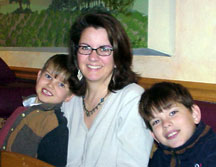

|
Reading: Slow and Gentle
Annette MacKay
I homeschool my two boys - always have. They are now nine and twelve (almost thirteen).
My twelve year old son was a late reader. He began catching on to reading at about ten years old.
Reading stories about other late readers really gave me the confidence to hang in there and support my son in a gentle and trusting way. I had many mantras that I would use on myself when the doubts rose up:
"They'll come to it in their own time."
"Statistically, by the age of thirteen, you can not tell when a person learned to read." Etc.
"He lives in a house filled with books, and has two parents that love to read - how could he possibly grow up illiterate in such an environment?!?!"

My son struggled with reading for years. He loved to be read to. He loved books on tape. Reading simply was not fun. We would do little bits of it: play a phonics game here and there, write our names in the cream cheese on our crackers, write in the sand on the beach, read signs - anything that was word related but not book bound. He was/is a lego maniac. Loves to build. He is capable of remembering great amounts of detail.
For years, I put up with flack from in-laws and concerned friends about his lack of ability in reading and our homeschooling. It took a great deal of energy on my part to keep that concern from swamping us. Each time I felt rocked/doubt I would go looking for another story of a late reader or a story of a bright kid sidelined as learning disabled in school.
Well, he did learn to read......gently and slowly......going from large print with not much on a page to the big, thick, small print, no pictures Star Wars anthology that came out just before Christmas. That was his first self read novel. Do you think he could have picked a bigger, more detailed book to begin with? He waded through that one in about four weeks.
I think the turning point for my son came, when, at the suggestion of many other homschooling moms of boys, I plunked a Calvin and Hobbs down within his reach. He was 10. He was not yet reading, he picked that book up and poured over the pages. He 'read' the entire thing without ever reading the words. He flagged page after page after page of favourite strips. I left him alone. Several weeks later he started coming to me for help with a word he didn't understand, or a strip he wanted to know more about but couldn't read the words. I would answer him and off he'd go. That was the beginning.
Now at almost thirteen, nothing is beyond his grasp, and he loves a good book. He's into Cornelia Funke's books at the moment, having recently read Inkheart and Thief Lord. He's also into Dungeons & Dragons. As a result of his passion for D&D he now fully understands how a reference book is put together and how to research something using a book.
An interesting side story to his reading path is that his younger brother was reading fluently by age seven.
Throughout the process, one of the things I looked forward to was being able to share my own successful late reader story someday. Well, there you go, I've just done that. (and I'm feeling a little teary as I write this.
To all of you with late readers, hang in there. You are doing the best thing you possibly can by homeschooling them. Stay gentle and keep the naysayers at large. You too will get to share your own successful late reader story some day. And when you do, you'll wonder what all the fuss was about.
UPDATE:
I think it's time to add an update to my article about my late reading son. It seems timely, as last week Lincoln started a class at the local college. He was accepted to the college under the early enrollment option and because his ACT scores were so high. He is 16 now and has been gloriously reading for about 4 years. His book shelf is full of books that he's read and loved. We were looking at it a few months back and were attempting to guesstimate how many pages those books represented, I think we decided somewhere around 25,000 pages. Wow.
A year and a half ago he enrolled in a local alternative ed school, an aeronautics based high school program. A short essay was required for the application. We discussed how he might answer the essay question and then he headed up stairs to write it. About an hour later he came back down, handed me a neatly printed sheet of paper and asked "How's this?" I read it, it was very good, there were only three minor spelling errors. Personally, I was stunned. We had never discussed grammar, never did a formal spelling lesson, never managed to get a written assignment out of him, and here was a beautifully, thoughtfully written short essay. Wow. I answered "This will do fine."
In a class of 28 students, all of which were products of the public school system, Lincoln's written work was significantly better than most of the work done in that class. It was not difficult for him to write at this level, he just did. In one class, they were each assigned a book to read during the semester that they would write a report on. Lincoln picked up the book on Friday and returned it on Tuesday. The teacher was stunned. She was just not used to kids that read for pleasure.
One year of the aeronautics school was enough. He began to get bored with the work, and did not see the value in continuing through graduation. So, he pulled out and put an application in at the local community college. They booked him in to write the ACT before deciding what classes he could take. His ACT scores in writing and comprehension were 93 & 92 (out of 100). Next up was a counselors appointment She said "You can't get higher than these scores. You don't have to take any of the prep courses, you are cleared to go right into the college level classes."
It is nice to be on this side of the issue. I look back at all those times I was so worried and I giggle. I wish I could find a way to communicate to new homeschoolers that it really will be OK. Just love them, support them, expect the best of them, and expose them to lots of good stories. It doesn't matter if they don't 'read' them themselves. Read to them, listen to books on tape (on rainy days and on car trips esp), watch live theatre, watch great movies, go to the library. Take the time to read books yourself. I read once that it was impossible for a child to grow up illiterate in a literate home. I agree.
Annette MacKay, doing the Mom thing in Lodi, CA. In the moments when they don't need her, she gardens, sews, renovates, and along with her DH is forever hunting the perfect wine.
 |
Back to BestHomeschooling Home |
Copyright 2004 BestHomeschooling.org. All rights reserved.
Please feel free to link to this site, BestHomeschooling. org, but do not
copy material and/or reproduce or distribute it in any way without
permission. Authors of articles retain the rights to their own
articles which may not be reproduced without their permission. |